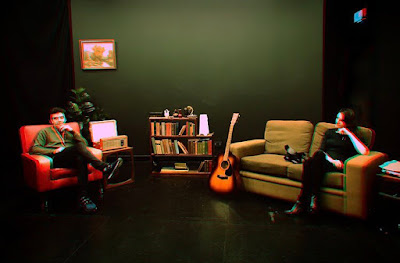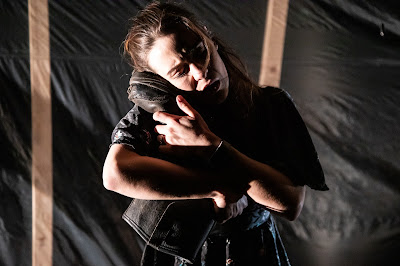A loudhailer and a Bible sit on the stage as the audience take their seats around it in the Shaftesbury Square venue. We listen to clips of Jim Wells criticising an event he hasn’t attended: “Stormont’s not Las Vegas, it’s not Soho, it’s the seat of government”.
We listen to McCann recreate a lengthy section of Pastor James McConnell’s controversial sermon (mispronunciations and all) and remind us of Peter Robinson’s televised reaction. Other than using props like the loudhailer to define his characters, there’s no mimicry of accents or speech patterns. DUPed is not unnecessarily cheap. In fact, for a show that played in the Edinburgh Fringe last summer, it’s no bundle of laughs.
McCann travels across to the
The playwright and performer is annoyed by the hurtful words spoken by politicians. He is annoyed by the increasing sense of distance between Scotland and Northern Ireland. Why don’t the people he meets back home in Scotland know about the “influence of an evangelical rump”? (There’s a strange sense of overlap with Dark of the Moon, a show I enjoyed and reviewed 24 hours earlier at the Lyric Theatre.)
I find it unsettling to sit through the performance, knowing so many of the people quoted in the performance, both those interviewed and those being critiqued. There’s no sense of distance. It’s also depressing, listening back to the abnormality that counts for normality in these parts. (That’s also part of the success of the mock campaign material – described by the alliterative Irish News as ‘phony pollster posters prompt palaver’ – an example of which is tied to a lamppost outside the theatre door.) And embarrassing to think that such dirty laundry might have been shared with audiences in Edinburgh last summer.
Speaking to those sitting around me after the show, a number feel fired up, wanting to do something with the clarity of thought they now felt they had. I wonder to myself whether a ‘Sean Mac Cana’ needs to unpick some of the absurd and negative rhetoric of republicans to fully pull the wool from over their eyes?
After a litany of all-male conversations, as the hundred-minute monologue drew to a close, it is left to author and freelance journalist Lyra McKee to reset McCann’s compass for the next step of his journey of resistance.
“We need to continue to have conversations with people we don’t like” she tells him. Don’t respond in kind to hurtful words. You entice bees with honey not vinegar. He realises that resistance can itself be as self-righteous and sectarian as the behaviour and rhetoric he loathes.
For some it is a revelation. For others, it’s anticlimactic. As someone who attends and reports from party conferences across the political spectrum, I already believe in the value of keeping good relations with everyone and seeing politicians and party apparatchik as whole people rather than just partisan mouthpieces.
McCann is going to have to keep catching the ferry from Cairnryan. Having listened to the critics, it’s now time to listen to the criticised. Given the lack of cheap shots in DUPed, the nuanced analysis of what he picks up from his next set of conversations will be fascinating to hear.
DUPed continues at Accidental Theatre until Saturday 30 March as part of Imagine! Belfast Festival of Ideas and Politics.


















































